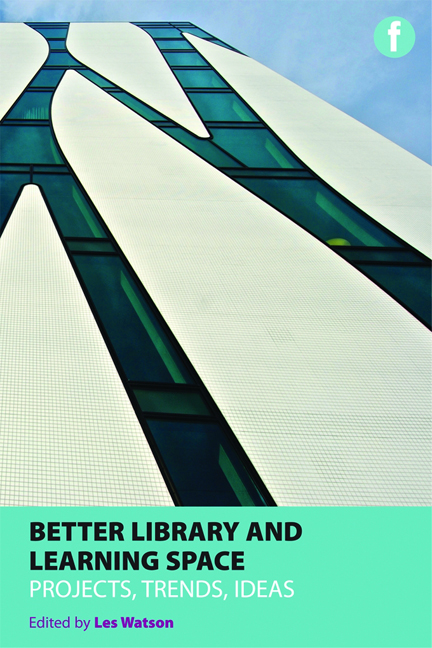Book contents
- Frontmatter
- Contents
- Case studies
- Acknowledgements
- Contributors
- Introduction – about this book
- PART 1 PROJECTS AND TRENDS
- PART 2 TRENDS AND IDEAS
- PART 3 IDEAS AND FUTURES
- Introduction
- 11 Beyond space: access is all – or is it?
- 12 Thinking inside the box
- 13 Nothing has changed/everything has changed – the enduring aspects of learning
- 14 Books, nooks and MOOCs
- 15 The researcher's view: context is critical
- 16 Libraries in the network society: evolution, revolution, extinction?
- 17 Powered by learning: developing models of provision to meet the expectations of new generations of students
- 18 The library has left the building
- 19 Beyond analogue: the learning studio as media-age library
- 20 3D libraries for 3D smarting
- 21 Learning landscapes, the library and the University of Lincoln: efficiency, effectiveness, expression and experimentation
- 22 Viral design: learners building better environments together
- 23 The interior designer's view
- 24 Furniture fit for the future – a brief exploration of library and learning furniture today and for the coming generation
- 25 Conclusions
- Index
21 - Learning landscapes, the library and the University of Lincoln: efficiency, effectiveness, expression and experimentation
from PART 3 - IDEAS AND FUTURES
Published online by Cambridge University Press: 08 June 2018
- Frontmatter
- Contents
- Case studies
- Acknowledgements
- Contributors
- Introduction – about this book
- PART 1 PROJECTS AND TRENDS
- PART 2 TRENDS AND IDEAS
- PART 3 IDEAS AND FUTURES
- Introduction
- 11 Beyond space: access is all – or is it?
- 12 Thinking inside the box
- 13 Nothing has changed/everything has changed – the enduring aspects of learning
- 14 Books, nooks and MOOCs
- 15 The researcher's view: context is critical
- 16 Libraries in the network society: evolution, revolution, extinction?
- 17 Powered by learning: developing models of provision to meet the expectations of new generations of students
- 18 The library has left the building
- 19 Beyond analogue: the learning studio as media-age library
- 20 3D libraries for 3D smarting
- 21 Learning landscapes, the library and the University of Lincoln: efficiency, effectiveness, expression and experimentation
- 22 Viral design: learners building better environments together
- 23 The interior designer's view
- 24 Furniture fit for the future – a brief exploration of library and learning furniture today and for the coming generation
- 25 Conclusions
- Index
Summary
The library exists ab aeterno. This truth, whose immediate corollary is the future eternity of the world, cannot be placed in doubt by any reasonable mind.
Borges (1964, 79)
E-learning landscapes
The concept of learning landscapes has become ubiquitous in higher education, encouraging universities to create networks of ‘discovery, and discourse between students, faculty, staff, and the wider community’, with a clear recognition that ‘campuses need to use academic space more effectively as well as efficiently’, built around ‘overlapping networks of compelling places’ (Dugdale, 2009).
The University of Lincoln, UK, is applying the concept of learning landscapes to its built estate. Following Dugdale (2009), the focus has been on effectiveness (pedagogical activities) as well as efficiency (space utilization) and the production of compelling spaces. However, beyond Dugdale's definition, these compelling spaces are being designed to express the meaning and purpose of higher education, or ‘the idea of the university’ (Neary and Saunders, 2011). The idea of the university is much more than its functionally defined subject specificities or technocratic networked spaces; it is derived from a university's ‘intimate connection with science and truth’ (Habermas and Blazek, 1987, 3). At the University of Lincoln ‘the idea of the university’ is created through the dynamic of the research process when students collaborate with academics to produce critical practical knowledge. At Lincoln this dynamic between student and academic is defined as student as producer; in other words the ‘idea of the university’ includes ‘the idea of the student’. In order to achieve this connection between the metaphysical idea of the university with the everyday life of its academics, students and professional services, the University of Lincoln has developed its own econcept: experimentation. Experiment means rigorous empirical methodology informed by appropriate conceptual framework. In this way the University is returned to the essence of its own foundational principles, valuing the principles of academic research around which the concept of student as producer is based (Neary, 2012; Neary, Williams et al., 2010).
Academics already contribute to the design of teaching and learning spaces as clients and customers of the project management process.
- Type
- Chapter
- Information
- Better Library and Learning SpaceProjects, trends and ideas, pp. 231 - 240Publisher: FacetPrint publication year: 2013



